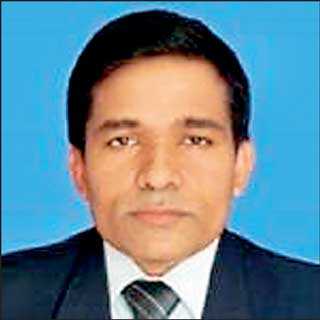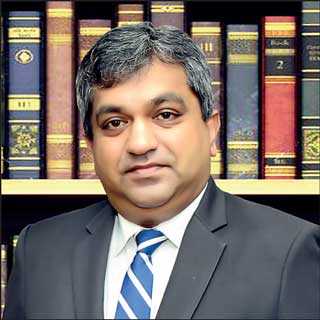Wednesday Feb 19, 2025
Wednesday Feb 19, 2025
Friday, 8 November 2019 00:00 - - {{hitsCtrl.values.hits}}
The Employers’ Federation of Ceylon (EFC) will unfold the eighth edition of its annual symposium on the theme ‘An Agenda for Change’ at the Cinnamon Grand Hotel today (8), creating a platform for
 |
(TVEC) Deputy Director General Janaka Jayalath |
 |
Employers’ Federation of
|
employers, employees and policy makers to deliberate on how best change can be championed for sustainable business.
Professionals representing a broad spectrum of sectors will share their expertise on three key areas: ‘Social Dialogue and Building Trust’, ‘Sustainable Enterprises’ and ‘Shifting Paradigms of the workplace’. The dialogue will be facilitated though panel discussions and case studies.
The digitalisation and globalisation of today’s labour market place a high demand on technical skills. Governments, employers and workers all have stakes in skills development. Adopting more relevant skills policies, making new investments in education, training and reskilling of workers and proactively acquiring such training and education are some of the aspects considered by the stakeholders in fostering a smooth transition into the future of work. The second session of the EFC’s Symposium themed ‘Sustainable Enterprises: Skills, Social Security Floors and Evidence Based Wage Fixation’ will be aligned in recognition of these demands. Tertiary and Vocational Education Commission (TVEC) Deputy Director General Janaka Jayalath, who is a panellist of this session, remarks that as the main body responsible for tertiary, vocational and education training in the country, TVEC has identified skills required to cater to the digital age and incorporated them into the TVET curricula. These include skills required for greener and cleaner jobs in terms of waste disposal, environment, energy saving and greener practices, complemented with soft skills required for jobs that include communication, leadership and attitude-building, said Jayalath.
In a bid to reskill workers and create more opportunities for youth, TVEC is also collaborating with the private sector. “With the introduction of new Industry Sector Skills Councils (ISSCs), TVEC is now able to collaborate with the industry. ISSCs now facilitate programs such as the Skills Gap Analysis, Development of National Competency Standards (NCS), and improvements in On-The-Job Training (OJT) mechanisms. The introduction of the ‘Skills Passport’ is another progressive initiative which enables better recognition for youth skills and at the same time makes the recruitment process hassle-free for employers,” said Jayalath. Urging the private sector to encourage its workforce to be equipped with the National Vocational Qualification (NVQ), considered the “pathway to streamlining the workforce”, he highlighted the multiple benefits of this State-accredited qualification. “National Competency Standards could be used to develop job roles as well as job descriptions, conduct performance appraisals, determine employee promotions based on performance evaluations. And the NVQ opens up many local and foreign job opportunities,” he concluded.
Enhanced investment in vocational learning, technical education and the introduction of more relevant skills policies are imperative if aspiring job seekers are to be on par with global working trends, observed Jayalath. Improving the capacity of the TVET sector in terms of teacher training, increased industry partnerships, streamlining instructor remuneration on par with other industry persons, having better infrastructure in terms of labs, equipment, material, teaching-learning resources and increased access to fine tune skills were cited in this regard. Employers’ Federation of Ceylon Director General Kanishka Weerasinghe remarked that it is imperative for employers to support the Government’s initiative to develop broad-based skills and incorporate elements such as soft skills and language, particularly the link language of English, into the curricula.
“In addition, employers should work closely with TVEC in order to develop and strengthen the NVQ framework and ensure that such standards are followed in training as well as at the point of recruitment.”
He further notes that Sri Lanka should transform itself into a “skills hub”, thus ensuring investors have easier access to a highly skilled workforce. “It is for this reason that we proposed and are supporting the concept of a ‘skills passport’, which is an initiative of the Training and Vocational Education Commission” said Weerasinghe.
Discover Kapruka, the leading online shopping platform in Sri Lanka, where you can conveniently send Gifts and Flowers to your loved ones for any event including Valentine ’s Day. Explore a wide range of popular Shopping Categories on Kapruka, including Toys, Groceries, Electronics, Birthday Cakes, Fruits, Chocolates, Flower Bouquets, Clothing, Watches, Lingerie, Gift Sets and Jewellery. Also if you’re interested in selling with Kapruka, Partner Central by Kapruka is the best solution to start with. Moreover, through Kapruka Global Shop, you can also enjoy the convenience of purchasing products from renowned platforms like Amazon and eBay and have them delivered to Sri Lanka.
Discover Kapruka, the leading online shopping platform in Sri Lanka, where you can conveniently send Gifts and Flowers to your loved ones for any event including Valentine ’s Day. Explore a wide range of popular Shopping Categories on Kapruka, including Toys, Groceries, Electronics, Birthday Cakes, Fruits, Chocolates, Flower Bouquets, Clothing, Watches, Lingerie, Gift Sets and Jewellery. Also if you’re interested in selling with Kapruka, Partner Central by Kapruka is the best solution to start with. Moreover, through Kapruka Global Shop, you can also enjoy the convenience of purchasing products from renowned platforms like Amazon and eBay and have them delivered to Sri Lanka.